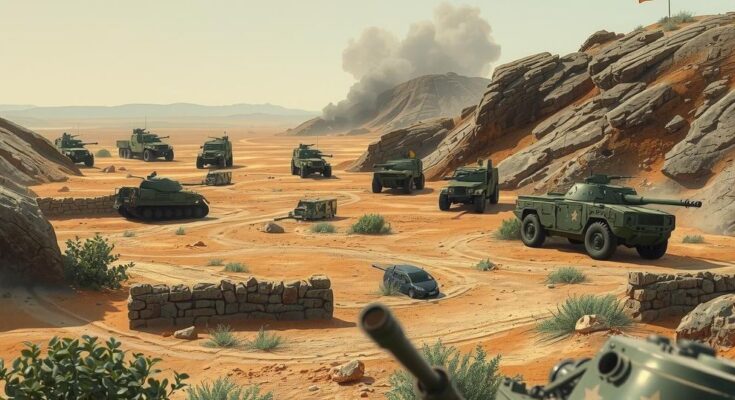The M23 armed group, backed by Rwanda, has seized the mining town of Walikale in the DRC, marking a significant territorial advance. Following a ceasefire initiative from Congolese and Rwandan leaders, the situation remains precarious as details on ceasefire negotiations are unclear. The conflict has halted major mining operations, impacting tin prices and raising humanitarian concerns.
On Thursday, local sources reported that the Rwanda-backed M23 armed group has taken control of Walikale, a key mining hub in the Democratic Republic of the Congo, despite a ceasefire initiative. This seizure represents the furthest advancement of the group into the interior since its emergence in 2012, affecting approximately 60,000 residents.
The capture occurred shortly after Congolese President Felix Tshisekedi and Rwandan President Paul Kagame engaged in surprise ceasefire talks in Doha. However, terms for a potential truce remain unclear, and Qatar, serving as a mediator, indicated that additional negotiations are required.
An officer in the Congolese military (FARDC) stated that they repositioned their forces approximately 30 kilometers away from Walikale in a bid to avoid further casualties as the M23 secured the area. Concurrent fighting was reported in nearby Mubi, confirming the escalation of conflict in the region. The situation has affected the operations of the Alphamin mining group, which has halted work at a significant tin mine due to security concerns.
The halt in mining operations is expected to impact tin prices due to supply chain disruptions, exacerbated by the material’s growing demand from electronic and renewable energy industries. The eastern DRC is also rich in gold mines, which further complicates regional dynamics.
Community representatives reported sightings of armed M23 fighters within Walikale. Humanitarian groups like Doctors Without Borders (MSF) expressed concern over potential casualties from ongoing hostilities, with local officials fearing an influx of injuries in the days ahead.
The M23 has rapidly expanded its territory in eastern DRC, causing significant unrest and elevating fears of a broader regional conflict. The strategic location of Walikale, at the intersection of vital trade routes, underscores its importance in the ongoing struggle for control in the area.
The DRC government has criticized Rwanda for allegedly supporting the M23 to access the region’s mineral wealth, a claim that Rwanda denies. However, a UN report suggested that Rwanda has approximately 4,000 troops in eastern DRC to aid the group. The Doha summit aimed to facilitate dialogue, with both presidents advocating for an immediate ceasefire, though no specifics were released regarding implementation details.
Despite hopes for a truce, analysts caution that the M23 lacks a defined negotiating agenda, indicating their primary objective remains the ousting of President Tshisekedi. Previous peace talks between Kinshasa and the M23 had already failed, reflecting the ongoing volatility in the region, where numerous ceasefire attempts have unraveled since 2021.
The recent capture of Walikale by M23 fighters highlights the intensifying conflict in the Democratic Republic of the Congo, raising critical concerns over regional stability and humanitarian impacts. Despite diplomatic efforts from Congolese and Rwandan leaders to establish a ceasefire, effective negotiation terms remain elusive. The implications of halted mining operations and rising tensions underscore the urgent need for a sustainable resolution and increased humanitarian support in the impacted areas.
Original Source: www.rfi.fr




